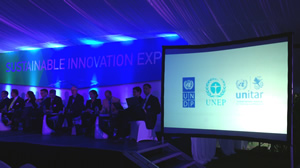Inter-agency Capacity Development Proposal at the UNEA-2 in Nairobi
25 May 2016, Nairobi, Kenya - The second session of the United Nations Environment Assembly (UNEA-2) is currently taking place at the UNEP headquarters in Nairobi, Kenya (23 – 27 May 2016). This year’s UNEA theme is focused on “Delivering on the environmental dimension of the 2030 Agenda for Sustainable Development”. The Assembly represents the world’s highest-level decision-making body on the environment, and serves as the environmental parliament that adopts resolutions for action to address the critical environmental challenges of our world.
 UNEA-2 counted on the participation of the United Nations Institute for Training and Research (UNITAR), who along with the United Nations Development Programme (UNDP) and the United Nations Environment Programme (UNEP) presented a proposal for a capacity development programme with the aims of supporting developing countries to strengthen access legislation for effective participatory environmental governance and justice.
UNEA-2 counted on the participation of the United Nations Institute for Training and Research (UNITAR), who along with the United Nations Development Programme (UNDP) and the United Nations Environment Programme (UNEP) presented a proposal for a capacity development programme with the aims of supporting developing countries to strengthen access legislation for effective participatory environmental governance and justice.
The programme is a key mechanism to respond to SDG 16 and linked environmental SDGs. Given the direct links between environmental governance and the lives and livelihoods of communities and economies and the 2030 agenda’s rights-based approach, it has multiple benefits across all SDGs. It is inspired by Principle 10 of the 1992 Rio Declaration on Environment and Development.
Principle 10 encompasses the rights to access information, access to public participation, and access to justice, which are fundamental pillars of sound environmental governance. A number of developing countries require support to carry out legal reforms to institutionalize Principle 10 within national governance frameworks for access to environmental information, public participation, and access to justice (access legislation). The development of access legislation is an important pre-requisite to strengthen participatory governance and the interaction of state institutions, private actors, and stakeholders in matters of environmental governance.
Related links
For more information about the programme, watch the video
For more information about UNITAR Principle 10 activities, please visit: http://www.unitar.org/ksi/environmental-democracy-and-rio-principle-10

